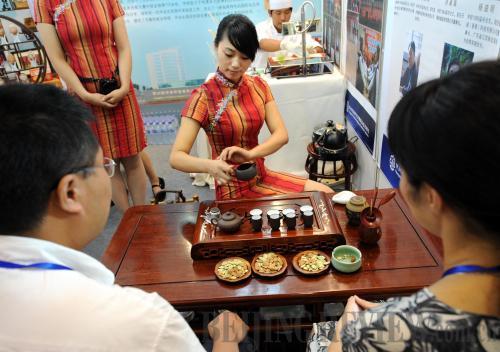|
 |
|
(PHOTO BY SUN CAN) |
Tea culture
Almost every tea drinker knows that China is the home of tea. According to popular legend, tea was discovered by Shen Nong, a legendary figure who tasted hundreds of kinds of medicinal herbs looking for medicine more than 5,000 years ago. Since then, tea has gone on to become the world's most widely consumed beverage.
In China, people drink tea daily. However, a true tea aficionado knows there are meticulous details to respect in order to make the perfect cup of tea. This includes the brewing time, the water quality and temperature as well as the type of teapots and cups.
If you want to enjoy the art of making and drinking tea while in China, head to a tea house. The tea house is a key element of Chinese culture, a place to gather and relax. Savoring tea and talking with friends is an age-old pastime. While resting, you will also have the opportunity to experience a relaxing tea ceremony. With very gracious, elegant and delicate gestures, the beautiful girls dressed in qipao,(traditional female outfit in China), will make tea as it has been done for centuries, with the care and ritual of an ancient art form.
Choosing tea
Various kinds of tea are grown in the vastly differing geographic locations and climates of China. Chinese teas are classified in different categories, such as black tea, white tea, green tea and oolong tea.
If you need a quick pick-me-up, go for black tea. Black tea is for those who would like to cut back on their caffeine intake but still need a fix. It has a strong flavor and goes well with just about any food, especially spicy dishes.
If you want to feel healthy and refreshed, try white tea. It contains the least amount of caffeine and the most antioxidants. It has a very light flavor since it's the least processed. It's quite unusual and as such more expensive. White tea is a specialty of southeast China's Fujian Province.
If you need stress relief then go for green tea. Not having as much caffeine as black tea, green tea has been subjected to many scientific and medical studies to determine the extent of its health benefits. Longjing tea is a classic example of a jade-colored green tea that has a leafy aroma and roasted nutty taste. Grown near the city of Hangzhou, it's been famous since the eighth century.
Now if you're not convinced with black tea or green tea, try oolong tea. Oolong tea has a larger spectrum of tastes and flavors than green tea. If you are only just beginning to discover tea, you may find it easier to appreciate. High quality oolong can be brewed multiple times from the same leaves, and unlike green tea it improves with reuse.
If you want to buy tea for yourself or to offer as a gift, the best place to go is the tea market. You will be able to sit down and taste any tea before you buy it.
Where to buy or drink tea
Beijing
Maliandao Tea Steet
(Tea market)
Maliandao Road
Xuanwu District
Lao She Teahouse
Bldg. 3, Qianmen Xidajie
Xuanwu District
Gong Wang Fu Teahouse
A14, Liuyin Street
Xicheng District
Shanghai
Tianshan Tea City
520 Zhongshan Xilu
Changning District
Geng Yue Ren Teahouse
4/F, Dragon Gate Mall, 235 Fangbang Zhonglu
Huangpu District
Yaqu Teahouse
918 Dongfang Lu
Pudong District
Guangzhou
Fangcun Tea Market (the largest in Asia)
Shiweitangjie Shancun
Fangcun District
Shui Mu Lian Qing Teahouse
Bldg. 1-2, 27-29 Liuyun Liujie
Tianhe Nan'erlu
Tianhe District
Chun Ya Yuan Teahouse
4/F, Changcheng Hotel 19 Siyou Xinmalu
Dongshan District |